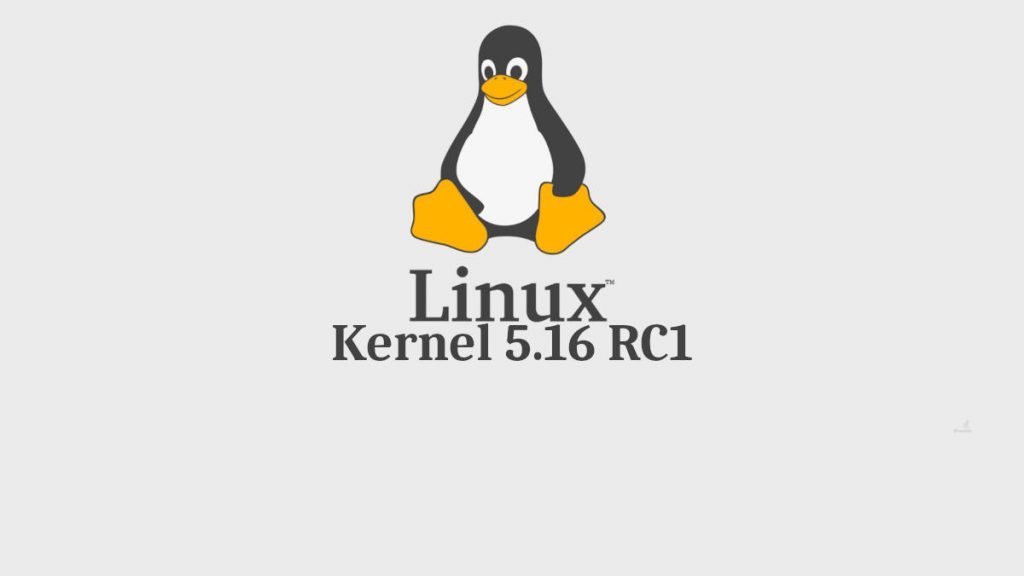Linux Kernel 5.16 RC1 is now available for download and testing. In this article, we touch-up the important features of this Kernel release.

The official merge window for Linux Kernel 5.16 is now closed. With that in mind, Linus Torvalds announced the first release candidate aka Linux Kernel 5.16 RC1 for developers to download and test.
Anyway, it’s not a huge release, although it’s also not a remarkably small one like 5.15 was (ok, “remarkably small” is relative, when even such small releases have 10k+ commits).. There’s a bit of everything in here, and you can look to the appended mergelog for some kind of flavor, but I guess the folio work is worth mentioning, since it’s an unusually core thing that we don’t tend to see most releases. The intent is to have a more efficient and type-safe way to specify “head of a group of pages”, rather than the page pointers and “compound_head()” and friends.
Linus
This Kernel plans to introduce support for new hardware across Graphics, Processors, networking, Ports. Moreover, a huge set of ARM updates, performance improvement to file systems, Apple M1 supports also stand out in this release.
Looking at the timelines and schedules of the Linux Distribution release, I am guessing that Ubuntu 22.04 LTS due on April 2022 and Fedora 36 should feature this Kernel.
That said, let’s take a look at the important updates in this mainline Kernel release.
Table of Contents
Linux Kernel 5.16 RC1 – Upcoming Updates
Processors
Intel’s Advanced Matrix Extensions support looks stable in this Kernel. This x86 chip extension introduces a different and performant approach for matrix operations.
Some important RISC-V architecture updates added in this Kernel version that enables open-source NVIDIA driver Nouveau support, as NVIDIA never made the RISC-V driver public.
The first patch for the Raptor Lake processor lands in this Kernel. Raptor Lake is the upcoming next-generation Intel Processors, succeeding the Alder Lake.
Mainline Linux Kernel now supports the system on module – Raspberry Pi Compute Module. This enables direct mainline Kernel support and doesn’t require any separate driver builds. This system on module chip used for commercial and industrial deployments.
As usual, ARM support list is huge in this mainline release.
Apple M1 PCI Express and GPIO driver is mainlined, making it closer to reality of M1 working out-of-the-box.
Snapdragon 690 (SM6350) and SM7225 SoCs supports from Qualcomm.
Support for Samsung’s first automobile processor (for Cars etc.) ExynosAutov9 introduced.
Following the tradition, more rockchip boards now supported in mainline. This particular release brings support for Rockchip RK3566 / RK3688 SoC boards.
Graphics
Intel’s upcoming Alder Lake S graphics support is complete and stable, it seems, in this release. It is not experimental anymore from this Kernel version, and it is not hidden behind the force_probe switch anymore. It is enabled by default.
New PCI IDs for Intel DG1 is available and initial work lands for DG2 graphics card. Intel DG2/Alchemist graphics card planned to launch in 2022.
The initial DisplayPort 2.0 Support lands for AMD Radeon Graphics cards. The current Radeon RX 6000 series only supports DisplayPort 1.4. So, in 2022, overall DisplayPort 2.0 adoption is likely.
More USB4 support for AMD Graphics card is introduced, which continued from earlier Kernel releases. This particular Kernel release adds patches for DisplayPort tunneling in AMD Graphics driver for the upcoming Yellow Carp/Rembrandt chips.
The AMD engineers added code to revamp the initial graphics driver loading from a PCI ID based discovery to IP table based approach. Typically, new graphics cards are identified using PCI IDs, which was a common approach. And now a clean and robust approach is introduced. A new IP discovery table contains various hardware information, which is now consumed by the Kernel. This helps to maintain and update the driver code in future and removes any hard coding of PCI IDs.
Intel’s Protected Xe Path (PXP) support lands in this Kernel, making the video sessions more secure.
Storage and Network
The recently made popular file system btrfs sees several performance improvements in the area of compression, logging, error handling and also various bug fixes.
Performance and fixes for XFS, F2FS.
Some important performance improvements for SMB3/CIFS client changes lands from Microsoft and SUSE.
Support for Realtek 802.11ax WiFi Driver RT89 (rtw89) lands in this release as well.
Misc Updates
More support for Sony PlayStation 5 and HP Omen Laptops.
Some updates added for the Steam Deck display panel.
A huge set of ASUS motherboards now have working sensor support via HWMON subsystem in this Kernel. You can find the list of motherboards here.
Apple Magic Keyboard 2021 support added in this Kernel.
System76 engineers introduces several patches catering to fan speed, batter performance, function keys and additional support for their line of Laptops.
Download
Download this release tarball here. Or refer below for direct link to tar, diff from the Kernel 5.15.
There should be multiple iterations until the final release, which is expected by the end of November/early December.